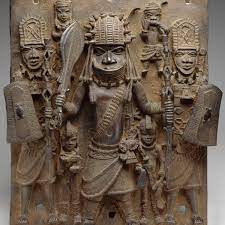NEWS
Ethnographer Advocates Carbon Dating Of Stolen Nigerian Artefacts Before Repatriation

Mr Edwin Akpam, an Ethnographer, on Sunday, stressed the need to use carbon dating to authenticate the stolen Benin bronze artefacts billed to be repatriated by Britain to Nigeria.
Carbon dating is the determination of the age of material by means of its content of carbon 14.
Akpam, Assistant Chief Ethnographer at the FCT Ethno History Museum.
According to him, the issue of stolen artefacts was a global phenomenon and not peculiar to Nigeria, but that Nigeria was a strategic country in terms of its cultural diversity.
“Nigeria is blessed with a lot of artefacts,, which were taken away or stolen, and we have them scattered all over the world, not only in Britain, even in France, Russia and so on.
“It is a good thing for them to have resolved to return our artefacts; there is a standard measure to determine the age of a particular artefact and that is done through carbon dating, which determines how long that artefact had really stayed.
“That has to be done before any measures to repatriate them, it has to be done in Britain, not after they have brought it to Nigeria, before we start doing it.
“It has to be done before packaging those artefacts to Nigeria”, he said.
Akpam was speaking on the heels of a recent move by Jesus College at the University of Cambridge to return a bronze statue of a rooster that was stolen during the 1897 British invasion of Benin city.
The invasion occurred when a British force of 1, 200 troops, under Sir Harry Rawson, captured and destroyed Benin city, and its royal palaces, eventually absorbed into Nigeria.
The ethnographer commended the efforts of the Council for Arts and Culture in projecting Nigeria’s image to the outside world through artefacts.
He explained that such moves often drew tourists to the country and promoted Nigeria’s cultural heritage in the international arena.
“We need to really gear up, sensitise Nigerians to treasure our artefacts and also prioritise the cultural sector, because there are some countries that depended solely on their artefacts, which serves as source of tourist attraction from around the world.
“I think we need to really emphasise that and promote our artefacts, by using whatever medium it takes to project our image culturally as a nation.
“Benin has a lot of rich culturally heritage, in terms of artefacts and the major medium that Benin is known for is the bronze statue or bronze art works right through the ages.
“Although, there are some terracotta, majority of their artefacts are in bronze forms and they are rich in that aspect, so that makes Benin unique in that field”, Akpam said.
He decried inadequate funding, a focus on crude oil and lack of priority in production and preservation of artefacts, to have negatively impacted the creative arts sector of the economy.
“The sector is still underfunded, it has not been given its rightful place, despite efforts by the Federal Ministry of Information and Culture, and other relevant bodies.
“Government needs to come in to support that sector, although a lot has been done, more still needs to be done to create the awareness that will place us on the desired platform,” he added.
He observed that Arts was gradually fading as a subject in school curriculum, urging that this should be revived to encourage vocational skills among children, at Primary and Secondary levels.
“We tend to downplay the potential of Nigerians who are very creative and in turn, neglect the creative industry, may be due to the priority we place on other sectors.
“Arts takes a long time to mature, it takes a long time to produce a work of art and these days, the patience is not there.
“We need to imbibe patience, to develop our skills, as it relates to production of arts; we also need stringent laws pertaining to preservation of our artifacts.
“The Nigeria Customs must be empowered to play their roles effectively, in scrutinizing goods coming in and going out, so that artefacts will not be taken from our country in future,” Akpam said.
Continue Reading
















